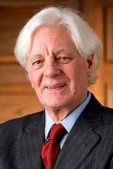BBG Watch
The following text is the written testimony of Kevin Klose, former Radio Free Europe/Radio Liberty President, before the Senate Foreign Relations Committee on November 17, 2015.

Kevin Klose was instrumental in saving Radio Free Europe / Radio Liberty (RFE/RL) after he became RFE/RL president for the second time in 2013. He rehired many of the dozens of Radio Liberty journalists in Russia who had been fired in 2012 by the previous RFE/RL management. But after his departure in 2014, a new wave of dismissals by the management of Radio Liberty’s Russian Service is again meeting with protests from human rights leaders in Russia and threatens Radio Liberty’s reputation.
One of those fired for the second time is human rights reporter Kristina Gorelik who has also become a target of vicious anti-Semitic attacks by pro-Putin Russian nationalists. Instead of keeping her employed and defending her from anti-Semitic attacks, Radio Liberty’s Russian Service management and RFE/RL lawyers in Moscow are attacking Kristina Gorelik in a Russian court.
Klose did not raise this specific issue in his congressional testimony on November 17, 2015. The hearing dealt with structural reforms being proposed for the Broadcasting Board of Governors.
In today’s testimony, a former BBG member and former RFE/RL executive, S. Enders Wimbush, criticized the Broadcasting Board of Governors for being incapable of dealing with serious management problems at Radio Free Europe/Radio Liberty.
S. Enders Wimbush said that “a current on-going investigation of possible financial and oversight malfeasance at RFE/RL in Prague, occurring from at least 2013 to the present, which has gained the attention of the OIG, the FBI, and possibly other federal authorities, is probably a low- point in BBG oversight, given that the BBG board knew of the problem at least a year before it acted, and then only weakly.”
Both Wimbush and Klose strongly supported creating a separate oversight board for the non-federal grantees of the BBG, which include RFE/RL.
The idea of two separate boards, one for the federal entities, including the Voice of America, and another one for the surrogate grantees such as RFE/RL, was opposed during the hearing by BBG Chairman Jeff Shell and BBG CEO John Lansing. Both Shell and Lansing, however, expressed support for other legislative reforms for the Broadcasting Board of Governors.

The committee hearing, “Options for Reforming U.S. Overseas Broadcasting,” was presided by Chairman, Senator Bob Corker (Republican – Tennessee). Ranking Member, Sen. Ben Cardin
Democrat – Maryland was also present along with several other committee members.
The entire hearing can be viewed here.
The committee also heard from:
Panel One
- Mr. John Lansing
Chief Executive OfficerBroadcasting Board of GovernorsWashington , D.C.
- Adobe Acrobat Document Download Testimony
- The Honorable Jeffrey Shell
Universal Filmed Entertainment Group, ChairmanBroadcasting Board of Governors, ChairmanUniversal City , CA
- Adobe Acrobat Document Download Testimony
- The Honorable Kenneth R. Weinstein
Hudson Institute, President And CEOBroadcasting Board of Governors, memberWashington , D.C.
- Adobe Acrobat Document Download Testimony
Panel Two
- The Honorable S. Enders Wimbush
Public Policy FellowWoodrow Wilson International Center for ScholarsWashington , D.C.
- Adobe Acrobat Document Download Testimony
Testimony of Kevin Klose
Former President of Radio Free Europe/Radio Liberty (RFE/RL)
Before the Senate Foreign Relations Committee
November 17, 2015
Thank you for inviting me to participate in this important event today.
Given the turmoil in the world, and the potential for U.S. International broadcasting, fewer subjects are more important or urgent than what the Committee is addressing today. I thank you for doing so.
As you know, I come to the subject having had experience as a journalist for 25 years with The Washington Post, including 4 years as Moscow Bureau Chief; then as President/CEO of RFE/RL
(twice), 5 years; Director of the U.S. International Broadcasting Bureau of the BBG, 2 years; and as President /CEO of National Public Radio (NPR), 8 years. I now teach journalism at the University of Maryland. So – I have seen the issues addressed today from a variety of perspectives. I have seen what works, and what doesn’t work.
In my first service as RFE/RL CEO in the mid-1990s, I worked closely with then VOA-Director Geoffrey Cowan to create a coordinated broadcast schedule that brought significant economies to U.S. international broadcasting, without diluting in any way the important complementary nature of the two networks. Similar cooperation continues today between these important, separate services. Most agree that the administration of U.S. international broadcasting needs to be fixed. There is less agreement on how to do so.
I believe for reasons I will cite today that H.R. 2323 is an important step in the right direction. I support the bill’s major provisions and would have only a few minor corrections and changes. I would be happy to share these with the committee at another time.
H.R. 2323’s core concept of two boards independent of each other reflects a decades-long evolution toward assuring the highest professional standards and principles of journalism for U.S. international media – by describing and maintaining an arm’s length structural “firewall” between journalists and foreign policy makers.
Numerous statements about these standards – and defense of them – are in the record ever since the very first Voice of America broadcast in 1942 declared, “The news may be good or bad. We shall tell you the truth.”
In the decades since, the Congress and White House administrations repeatedly altered the relationships of the news networks and foreign policy-making agencies, in 1994 creating the current parttime federal Broadcasting Board of Governors, and double-hatting it as the oversight board for the original private grantee RFE/RL as well as a brand new independent grantee, Radio Free Asia (RFA). This legislation contains the so- called “firewall provision’ still in effect, which provides that “The Secretary of State and the Board, in carrying out their functions, shall respect the professional independence and integrity of the International Broadcasting Bureau, its broadcasting services, and the grantees of the Board.”

Surely this important statement belongs in H.R. 2323. I reckon it should be included. It adds to the important reform contained in H.R. 2323: creation of a separate board of directors for the newly-created consolidated grantee, Freedom News Network (FNN). The Secretary of State alone would be a member of both this new board and the continuing BBG. All other members of the BBG and the FNN board would NOT be double-hatted, or “overlapped.”
Creation of this new FNN board would virtually guarantee effective separation of foreign-policy makers and the private, non-profit grantee networks – RFE/RL, RFA, and Middle East Broadcasting Network (MBN). I support such a change.
Adding such a board is in accordance with a finding contained in a 2013 State Department IG report that “The system of having BBG Governors serve concurrently on the corporate board[s] of the grantees creates the potential for — and in some cases, actual — conflict of interest, as perceived by many and gives rise to widespread perception of favoritism in Board decisions.” I would add that such a separation also strengthens the journalistic independence and integrity of the grantees.
I would refer to the highly successful National Endowment for Democracy as a model for a separate non-profit board.
H.R. 2323 also would establish a new position of CEO to run the new Freedom News Network consolidating the private, non-profit independent grantees. I would support the move to vest operational authority for the new agency in a single agency head such as a CEO or director.
Rather than create two separate CEO positions, some commentators may advocate “double-hatting” the federal agency CEO as also the CEO for the newly created private grantee organization. I oppose such an arrangement, as it would seem to challenge provisions in current law and in HR 2323 stating that nothing in the law shall be construed to make the grantees a federal agency or instrumentality. A federal employee as the single CEO of all USIM would undermine the important separations intended in H.R.2323. It would present serious conflict of interest issues such as noted for the board in the 2013 IG report.
H.R. 2323 states that nothing in the law shall be construed to make the grantees a federal agency or instrumentality.
But the courts could construe otherwise, with unforeseeable consequences. A single CEO would undermine the basic grantor-grantee relationship which under the Federal Grant and Cooperative Agreement Act and its regulations do not permit “substantial involvement” by the grantor in the activities of the grantee.
Placement of a federal CEO over the grantee FNN would undermine the long-standing arm’s length relationship with the federal government so necessary for preservation of grantees’ journalistic independence and credibility.

I support the goal of H.R. 2323 to clarify the distinct missions of the grantees and the VOA. Grantees focus on reporting local and regional news for their countries’ internet, wifi, social media, and radio publics — substitutes or “surrogates” for often malign, local media who are “DIS-INFORMATION specialists.” Unlike the VOA, the grantees do not broadcast editorials which represent the views of the United States Government, or produce much news about the United States.
Preserving the BBG-grantee arm’s length relationship protects grantees and the Department of State from complaints by foreign governments about grantee broadcasts.
H.R. 2323 supports a proven winning formula of what I call parallax – two headlights in the dark are better than one — where both VOA and grantees target the same countries or regions, — penetration of the darkness with depth and immediacy — two headlights for publics in media-darkened lands where truthful news of home and abroad is feared and despised by their leaders.
U.S. International media must be consistent with the BROAD foreign policy objectives of the U.S. We report and distribute news not to make profit, but ultimately to further free speech, human rights, democracy, freedom, mutual understanding, and peace where there is little or none. We do so through objective reporting on key issues. This is all in accord with Article 19 of the Universal Declaration of Human Rights which is cited both in current law and in H.R. 2323.
I support the goals envisioned by this effective reforming legislation.
Thank you for the opportunity to participate in this important hearing.
